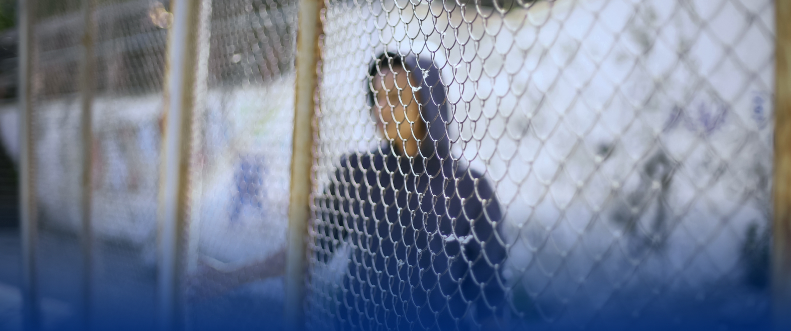
If your child has been arrested in New Jersey, you are right to be seriously concerned. After all, a conviction can have long-term ramifications on their life and their future. Your child may be facing time in a juvenile detention facility, heavy fines, and community service, depending on the nature of the crime. You might also be worried about how a juvenile conviction could impact their application to college or employment opportunities later on.
When you want the best for your child, you will do anything to protect them. When criminal charges are involved, that means hiring an experienced juvenile crime lawyer in Middletown Township who can fight for the best possible outcome. At Keith Oliver Criminal Law, we routinely represent minors charged with juvenile crimes in Monmouth, Somerset, and Mercer counties. We also have extensive experience handling expungements of juvenile criminal records.
Contact us today for a free and confidential consultation.
Common Types of Juvenile Crime Cases We Can Help With
The New Jersey juvenile crime attorneys at Keith Oliver Criminal Law have successfully handled a wide range of cases involving:
- Drug crimes ─ As kids grow up, they may begin taking risks, particularly if their peers pressure them. Some teens will seek alcohol, cigarettes, marijuana, prescription painkillers, and hard drugs. It is a crime for any person to possess illegal drugs, regardless of age. It is also a crime for minors to purchase tobacco products and possess specific amounts of marijuana if they are under 21. The punishment for possession of illegal drugs is greater if it occurs on school grounds.
- Underage drinking ─ Many young people purchase and consume alcohol. In fact, according to the National Institute on Alcohol Abuse and Alcoholism, around 24.6 percent of 14- to 15-year-olds admitted to having at least one drink. Roughly 7 million young people ages 12 to 20 admitted to drinking more than just a few sips of alcohol within the last month. Underage drinking may be common, but it’s still a crime for minors to possess alcohol.
- Sexual offenses ─ If teens send explicit images of themselves to others, or share images of underage friends, that could be considered child pornography. Teens may also be caught up in situations where they are charged with rape or sexual assault.
- Assault ─ Schoolyard fights can seem like a rite of passage for some. But juvenile assault and battery occur when a minor threatens someone with violence and then makes physical contact with them. Sometimes, assault crimes are accompanied by other crimes like theft.
- Theft ─ Juvenile theft occurs when a minor takes items that belong to someone else. Theft may seem like a small way of acting out, but it can result in a criminal charge.
- Shoplifting ─ Juvenile shoplifting is a type of theft that occurs when minors steal goods from retail outlets, grocery stores, gas stations, and other stores. Often, kids will take items that are cheap or disposable. No matter how cheap the item, the child can face charges.
- Vandalism ─ Vandalism perpetrated by juveniles can take many forms, including graffiti, smashing windows, destroying signage, or otherwise defacing someone else’s property.
- Disorderly persons ─ Disorderly conduct occurs when a minor’s actions or misconduct cause a disturbance to the public. Lewd behavior, harassment, drunk and disorderly behavior, refusal to disperse, rioting, fighting, and illegal loitering can all be types of disorderly conduct.
- Computer crimes ─ Some juveniles commit crimes on the internet. Juvenile cybercrime includes illegal actions such as digital piracy (illegally downloading software, music, and movies without getting the copyright holder’s permission), viewing or exchanging pornographic material, and criminal trespassing via computer, also referred to as “unauthorized access.”
If your child is facing serious criminal charges, the best way to help them is to hire an accomplished New Jersey juvenile crimes attorney to handle their case. While many juvenile crimes are considered disorderly persons offenses (misdemeanors), some are indictable offenses (felonies) and carry harsh penalties.
How an Experienced Middletown Township Juvenile Crime Lawyer Can Help
Although many juvenile crimes are not punished the same way as adult crimes, a juvenile can still face detainment and other serious consequences. A child will also carry their juvenile record with them into adulthood, which can make life difficult even after the sentence has been completed.
That’s why it is so important to retain legal counsel as soon as possible after your child is arrested. Your child has a much better chance of avoiding severe punishment and long-term consequences if you have an attorney who can advocate for their best interests from the beginning. A New Jersey juvenile criminal defense lawyer from Keith Oliver Criminal Law can help by:
- Explaining your child’s rights in an easy-to-understand way
- Providing you with solid advice based on an intimate knowledge of the juvenile legal system in New Jersey
- Examining the prosecution’s case and identifying all potential weaknesses
- Conducting an investigation to gather evidence and talking to witnesses in support of your child’s defense
- Taking every opportunity to fight for the charges to be reduced or get the case dismissed
- Fighting to keep the case in family court if the prosecution is pushing to have your child tried as an adult
- Crafting an effective and robust defense on behalf of your child
- Representing your child in court and advocating for their best interests, including minimum sentencing if a plea deal is the best option
At Keith Oliver Criminal Law, we understand how serious a juvenile conviction can be and how it can affect your child’s life for years to come. Our attorneys will work tirelessly to fight for your child’s freedom and future.
Understanding New Jersey Juvenile Sentencing Guidelines
If your child is found guilty of a crime in juvenile court, the court should impose a sentence focused on the potential for your child to be rehabilitated while also holding them to account for their misconduct. Some of the most common potential consequences for juveniles include:
- Fines
- Restitution (compensating victims of crimes for losses)
- Community service
- License suspension
- Juvenile detention
At your child’s juvenile hearing, our attorneys will provide a compelling defense against the charges brought by the prosecution. If a plea deal is in your child’s best interests, we will work with the judge and the state to seek a more empathetic type of justice, such as serving community service or spending time in a community-based program rather than being detained in a juvenile center. We will do everything in our power to help your child avoid detainment.
What You Need to Know About Expungement of Juvenile Criminal Records
If your child has been charged with a juvenile crime, you might be wondering whether the crime remains on their record permanently. In most cases, juvenile records are sealed and can only be accessed by law enforcement, the courts, and certain government entities.
In New Jersey, you can apply to have your child’s records kept confidential by arguing that making the records public would cause your child “specific and extraordinary harm.” Some juvenile offenders can also have their records expunged after five years have passed since they were released from detainment, depending on the type of crime they committed.
Juvenile Crime FAQs
Below, our team has answered some of the most common questions we get from our clients regarding juvenile offenses. Please contact our office at any time to discuss the specifics of your child’s case.
Many parents naturally worry that their child will be charged as an adult, especially if they are close to turning 18. If your child is under 15, they cannot be charged as an adult unless they have committed a very serious offense and the prosecutor chooses to try them as an adult. Ultimately, the judge in the adult court has the authority to decide whether they will hear the case in adult court or send the case back to family court.
Naturally, trying the case in juvenile court is preferable because it expands your child’s legal options, and juvenile sentences tend to be more compassionate and lenient than sentences for adults. Unlike the adult court system, juvenile justice focuses on a child’s rehabilitation capacity. If the prosecutor in your child’s case decides to try your child as an adult, our attorneys will fight tooth and nail to keep the case in family court.
While some juvenile cases do go before a family court, there are alternative options that your attorney can help you pursue, such as:
- Informal hearing ─ If your child accepts responsibility for their crime, you could go before a judicial referee at an informal hearing to obtain a judgment and recommended sentence. These will need to be reviewed and approved by a judge.
- JCC vs. ISC ─ Your child could also go before a Juvenile Conference Committee (JCC) or an Intake Services Conference (ISC). A JCC consists of a group of volunteers, while an ISC is made up of judicial staff. Your child will appear before the JCC or ISC, and the committee will propose a sentence for their crime, such as community service. If the court approves the proposed sentence, your child will not have to stay in a juvenile detention center.
It’s normal to be anxious about your child participating in a formal hearing with a judge. If you wish to avoid family court, our attorneys will work to help you pursue an alternative solution.
It might be possible to get your child’s charges reduced or dropped depending on the severity of the crime and the effectiveness of their defense. If the prosecution cannot prove every aspect of their case beyond a reasonable doubt, then the charges against your child could be dropped. Even if a not-guilty verdict isn’t attainable, a juvenile crime lawyer can work to poke holes in the prosecution’s case and potentially get your child’s charges reduced.
If your child goes before a JCC or ISC for an informal hearing and fulfills all their sentencing requirements, then they could have their charges dismissed by the court.

